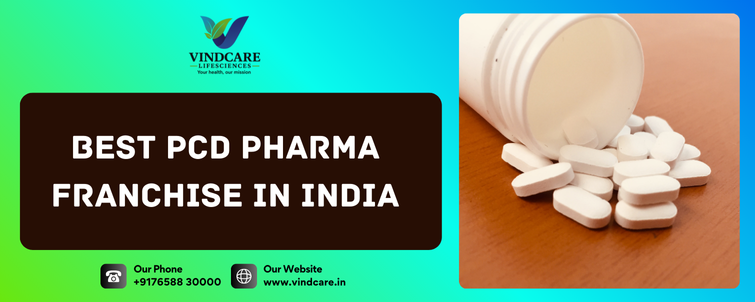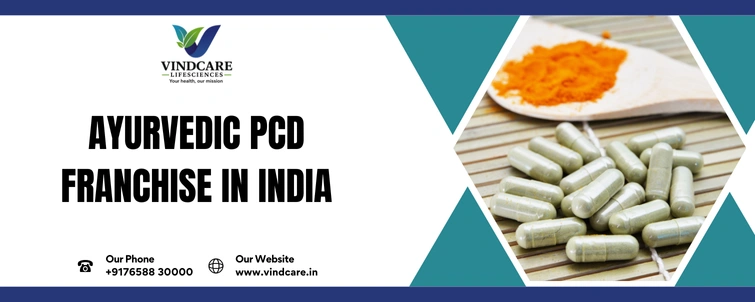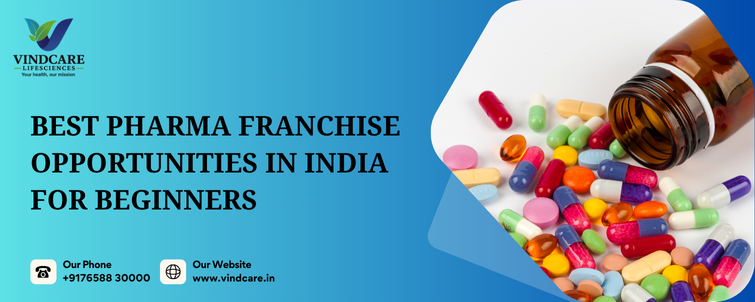- Plot no 229, 1st and 2nd floor Phase 1, Ind. area, Panchkula - HR 134 113
- +91- 76588 30000
- info.vindcare@gmail.com
Third Party Pharma Manufacturing Companies in India

Best PCD Pharma Company in Odisha
May 31, 2025
Best PCD Pharma Franchise Companies in India
May 31, 2025Table of Contents
ToggleThird Party Pharma Manufacturing Companies in India : Vindcare Leading the list
India, often referred to as the “Pharmacy of the World,” is a global leader in pharmaceutical manufacturing, contributing 20% of the world’s generic drug exports. With over 60,000 generic products across 60 therapeutic categories and a market projected to reach $130 billion by 2030, the Indian pharmaceutical industry is a powerhouse of innovation and affordability. Within this ecosystem, Third Party Pharma Manufacturing has emerged as a strategic business model, enabling companies to outsource production to specialized manufacturers, thereby reducing costs and focusing on core competencies like marketing and distribution.
Explores the Third Party Pharma Manufacturing companies in India, their benefits, processes, challenges, and how to choose the right partner, with a spotlight on Vindcare Lifesciences as a leading example. We also include a FAQ section to address common queries and data-driven insights to ensure relevance for 2025.
What is Third Party Pharma Manufacturing?
Third Party Pharma Manufacturing, also known as contract manufacturing, is a business arrangement where a pharmaceutical company outsources the production of its products to a specialized manufacturer. The marketing company provides the brand name, packaging specifications, and formulations, while the third-party manufacturer handles production, quality control, and sometimes packaging. This model is distinct from PCD (Propaganda Cum Distribution) franchises, as it focuses solely on manufacturing without involving distribution rights.
Key Features of Third Party Pharma Manufacturing
- Outsourcing Production: Companies without manufacturing facilities can produce high-quality drugs under their brand.
- Cost Efficiency: Eliminates the need for investing in production units, machinery, or labor.
- Regulatory Compliance: Manufacturers adhere to WHO–GMP, ISO, and DCGI standards.
- Scalability: Allows flexible production volumes based on market demand.
The Indian third-party manufacturing sector has grown by 25% in recent years, driven by increasing demand for affordable, high-quality medicines. With over 2000 WHO-GMP certified units, India is a hub for third-party manufacturing, attracting both domestic and global players.
Benefits of Third Party Pharma Manufacturing
Third Party Pharma Manufacturing offers numerous advantages for pharmaceutical companies, startups, and entrepreneurs. Here’s why this model is gaining traction in India:
- 1. Cost Savings
- Setting up a manufacturing unit requires significant capital investment in infrastructure, machinery, and skilled labor. Third Party Pharma Manufacturing allows companies to bypass these costs, leveraging the economies of scale of established manufacturers. For example, companies like Vindcare Lifesciences provide cost-effective production with WHO-GMP certified facilities, reducing expenses by up to 30-40% compared to in-house manufacturing.
- 2. Focus on Core Competencies
- By outsourcing production, companies can concentrate on research, marketing, and distribution. This is particularly beneficial for startups and small businesses lacking the resources for in-house production. For instance, Vindcare Lifesciences offers comprehensive manufacturing services, allowing clients to focus on brand building and market expansion.
- 3. Quality Assurance
- Reputable Third Party Pharma Manufacturing companies adhere to stringent regulatory standards, such as WHO-GMP, ISO 9001:2015, and DCGI certifications. This ensures high-quality, safe, and effective products, reducing the risk of recalls or regulatory issues.
- 4. Scalability and Flexibility
- Third-party manufacturers can adjust production volumes based on market demand, offering flexibility that in-house facilities may lack. This is crucial in a dynamic market like India, where consumer needs evolve rapidly.
- 5. Access to Advanced Technology
- Top manufacturers, such as Akums Drugs & Pharmaceuticals, invest in state-of-the-art facilities and R&D, enabling clients to produce innovative formulations without investing in costly equipment.
- 6. Faster Time-to-Market
- With established production processes and supply chains, third-party manufacturers ensure quicker product delivery, enabling companies to capitalize on market opportunities.
Top 10 Third Party Pharma Manufacturing Companies in India for 2025
Below is a curated list of the best Third Party Pharma Manufacturing companies in India, selected based on their reputation, certifications, product range, and client support. Vindcare Lifesciences is highlighted as a leading example due to its innovative approach and client-centric services.
1. Vindcare Lifesciences: A Leader in Third Party Pharma Manufacturing
Vindcare Lifesciences, based in Panchkula, Haryana, is a standout in the Third Party Pharma Manufacturing landscape. With WHO-GMP certified facilities and a diverse portfolio spanning tablets, capsules, syrups, injections, and nutraceuticals, Vindcare delivers high-quality products tailored to client needs. Key features include:
- Advanced Manufacturing: State-of-the-art facilities with high-shear granulation and film coating technologies.
- Customizable Solutions: Offers private labeling and bespoke packaging.
- Rapid Turnaround: Delivers products within 30-45 days, ensuring minimal market delays.
Vindcare’s commitment to quality, affordability, and innovation positions it as a top choice for Third Party Pharma Manufacturing in 2025.
2. Akums Drugs & Pharmaceuticals
Akums, India’s largest Contract Development and Manufacturing Organization (CDMO), operates 15+ state-of-the-art facilities. Known for its R&D-driven approach, Akums offers a wide range of dosage forms, including injectables, soft gels, and nutraceuticals. Highlights:
- Global Standards: WHO-GMP, ISO, and FDA-Ghana certifications.
- Extensive Portfolio: Covers cardiology, neurology, and derma segments.
- Client Trust: Partners with leading brands like Lupin.
3. Sigma Softgel & Formulation
Based in Baddi, Himachal Pradesh, Sigma Softgel is a leading Third Party Pharma Manufacturing company with ISO 9001:2008 certification. Specializing in soft gels, tablets, and injectables, Sigma offers:
- High-Volume Production: Advanced equipment for large-scale manufacturing.
- Quality Control: Supervised by experienced doctors and pharmacists.
- Affordable Pricing: Competitive rates for startups.
4. Protech Telelinks
Protech Telelinks, an ISO 9001:2015 certified company, is renowned for its high-quality production and innovative packaging. Key features:
- Diverse Range: Includes dry beta, non-beta, and liquid vials.
- Daily Capacity: 1.2 million vials for beta-lactam injections.
- Nationwide Distribution: Strong logistics for timely delivery.
5. Associated Biotech
Associated Biotech is a trusted name in Third Party Pharma Manufacturing, offering WHO-GMP certified products across multiple therapeutic segments. Benefits include:
- Cost Efficiency: Leverages economies of scale.
- Comprehensive Solutions: From production to packaging.
- Regulatory Compliance: Adheres to global standards.
6. NB Healthcare
With 17+ years of experience, NB Healthcare is a top Third Party Pharma Manufacturing company in India. Their ISO-certified facilities produce a wide range of products, including:
- Innovative Packaging: Meets client-specific needs.
- Quality Assurance: WHO-GMP certified plants with clinical trials.
- Global Reach: Exports to 10+ countries.
7. Sonika Lifesciences
Sonika Lifesciences, based in Panchkula, is a WHO-GMP certified manufacturer known for its diverse product range, including capsules, tablets, and syrups. Key highlights:
- Customer-Centric Approach: Tailored formulations and packaging.
- High-Quality Standards: Adheres to WHO guidelines.
- Scalable Production: Ideal for startups and large brands.
8. Lifevision Healthcare
Established in 2010, Lifevision Healthcare is an ISO 9001:2008 certified company offering Third Party Pharma Manufacturing services. They specialize in:
- Advanced Technology: WHO-approved manufacturing processes.
- Wide Product Range: Includes nutraceuticals and pediatric drugs.
- Client Support: Offers marketing consultancy.
9. Curivo Healthcare
Curivo Healthcare, a leading Third Party Pharma Manufacturing company, operates two high-capacity manufacturing units in Baddi. Features include:
- Global Presence: Exports to 30+ countries.
- Certifications: WHO, GMP, GLP, and ISO.
- Rapid Delivery: Ensures minimal business interruptions.
10. Knox Lifesciences
Knox Lifesciences, based in Chandigarh, is a trusted Third Party Pharma Manufacturing company with over 1000+ formulations. Highlights:
- WHO-GMP Certified: Ensures high-quality production.
- Low MOQs: Flexible for small businesses.
- Specialized Segments: Includes antibiotics and multivitamins.
The Third Party Pharma Manufacturing Process
Understanding the Third Party Pharma Manufacturing process is crucial for companies seeking to outsource production. Here’s a step-by-step overview:
- 1. Product Selection
- The client selects products from the manufacturer’s portfolio or provides specific formulations, dosage forms, and packaging requirements. For example, Vindcare Lifesciences offers over 1000 formulations for clients to choose from.
- 2. Quotation and Agreement
- The manufacturer provides a detailed quotation covering production costs, packaging, and delivery timelines. A manufacturing agreement is signed, specifying terms, quality standards, and intellectual property rights.
- 3. Raw Material Sourcing
- High-quality raw materials are sourced from certified suppliers. Manufacturers like Akums ensure raw materials meet WHO-GMP standards.
- 4. Production
- The manufacturing process involves blending, granulation, compression, coating, and packaging, conducted in WHO-GMP certified facilities. Advanced technologies like high-shear granulation and fluid-bed processing are used.
- 5. Quality Control
- Each batch undergoes rigorous testing in in-house labs equipped with tools like High-Performance Liquid Chromatography (HPLC) and Gas Chromatography. This ensures compliance with quality, purity, and efficacy standards.
- 6. Packaging and Delivery
- Products are packaged as per client specifications, often with private labeling. Manufacturers like Protech Telelinks offer innovative packaging to enhance market appeal. Timely delivery is ensured through robust supply chains.
Challenges in Third Party Pharma Manufacturing
While Third Party Pharma Manufacturing offers significant benefits, it also comes with challenges that companies must address:
- 1. Quality Consistency
- Maintaining consistent product quality across batches is critical. Some manufacturers fail to uphold standards over time, risking product recalls. Choosing WHO-GMP certified partners like Vindcare Lifesciences mitigates this risk.
- 2. Production Delays
- Supply chain disruptions or raw material shortages can delay production. Manufacturers with strong logistics, like NB Healthcare, minimize such risks.
- 3. Limited Customization
- Some third-party manufacturers offer limited flexibility in formulations or packaging. Companies like Curivo Healthcare address this by providing bespoke solutions.
- 4. Regulatory Compliance
- Navigating complex regulatory requirements, such as DCGI approvals, can be challenging. Partnering with certified manufacturers ensures compliance.
- 5. Intellectual Property Risks
- Proprietary formulations may be vulnerable to misuse. Clear manufacturing agreements and trusted partners like Akums safeguard intellectual property.
How to Choose the Right Third Party Pharma Manufacturing Company
Selecting the right Third Party Pharma Manufacturing partner is critical for success. Here are key factors to consider:
- 1. Certifications and Compliance
- Ensure the manufacturer holds WHO-GMP, ISO, and DCGI certifications. Vindcare Lifesciences, for example, adheres to global standards, ensuring product safety and efficacy.
- 2. Product Portfolio
- Choose a manufacturer with a diverse range of dosage forms and therapeutic segments. Companies like Sigma Softgel offer extensive portfolios, catering to varied market needs.
- 3. Infrastructure and Technology
- Look for state-of-the-art facilities with advanced machinery. Akums and Protech Telelinks invest in cutting-edge technology for efficient production.
- 4. Quality Control
- Verify the presence of in-house testing labs and rigorous quality assurance processes. Delwis Healthcare uses HPLC and Gas Chromatography for quality checks.
- 5. Delivery Timelines
- Timely delivery is crucial for market competitiveness. Manufacturers like Curivo Healthcare ensure rapid turnaround times.
- 6. Client Support
- Choose a manufacturer offering marketing support, consultancy, and low MOQs. Knox Lifesciences excels in client-centric services.
- 7. Reputation and Experience
- Partner with established companies with a proven track record. Vindcare Lifesciences and NB Healthcare have built strong reputations over years of operation.

Data-Driven Insights: The Indian Pharma Market in 2025
The Indian pharmaceutical industry is poised for significant growth, driven by:
- Market Size: Expected to reach $130 billion by 2030 with a CAGR of 10-12%.
- Export Growth: India accounts for 20% of global generic drug exports, with 584 US FDA-approved and 1105 Europe-certified units.
- Third-Party Manufacturing Growth: The sector has grown by 25% in recent years due to rising demand for affordable medicines.
- Consumer Awareness: Increasing demand for quality pharmaceuticals and nutraceuticals fuels the need for reliable third-party manufacturers.
These trends highlight the strategic importance of Third Party Pharma Manufacturing in meeting market demands efficiently.
FAQ: Third Party Pharma Manufacturing in India
1. What is Third Party Pharma Manufacturing?
Third Party Pharma Manufacturing involves outsourcing the production of pharmaceutical products to a specialized manufacturing company. This allows the client company to focus on brand marketing, promotion, and distribution without owning a manufacturing unit.
2. How is Third Party Pharma Manufacturing different from PCD Pharma?
Third-party manufacturing is primarily concerned with the production of medicines, while PCD Pharma deals with the distribution and marketing of those products in specific territories. Companies like Vindcare Lifesciences offer both services, giving clients greater flexibility and business expansion options.
3. What documents are required for Third Party Pharma Manufacturing?
To start a third-party manufacturing partnership, the following documents are typically required:
- Drug License
- GST Certificate
- Manufacturing Agreement
- Company PAN Card
- Quality Control and Product Specifications
These documents ensure legal compliance and streamline the production process.
4. What are the benefits of Third Party Pharma Manufacturing?
Third-party manufacturing offers several benefits:
- Cost Efficiency – No need to invest in a production facility
- Scalability – Easily increase or decrease production as needed
- Quality Assurance – Access to GMP and WHO-certified manufacturing units
- Focus – Enables companies to focus on marketing, branding, and customer acquisition
5. How can I start a Third Party Pharma Manufacturing partnership with Vindcare Lifesciences?
You can begin by visiting vindcare.in. Submit an inquiry form or call the provided contact number. Their expert team will guide you through product selection, documentation, and the agreement process
6. What are the challenges in Third Party Pharma Manufacturing?
Some potential challenges include:
- Ensuring consistent product quality
- Production delays or MOQ constraints
- Limited customization flexibility
- Regulatory and compliance management
- Protecting intellectual property
Choosing an experienced and certified manufacturer like Vindcare Lifesciences reduces these risks significantly.
7. How much does Third Party Pharma Manufacturing cost?
The cost depends on:
- Packaging and branding customizations
- Product category (e.g., tablets, capsules, syrups)
- Order volume
The Future of Third Party Pharma Manufacturing in India
The Third Party Pharma Manufacturing sector is set to grow exponentially in 2025, driven by:
- Rising Demand: Increasing prevalence of chronic diseases like diabetes and cardiovascular issues fuels demand for quality medicines.
- Global Expansion: Indian manufacturers are expanding exports to over 30 countries, with companies like Curivo Healthcare leading the way.
- Technological Advancements: AI-driven production and quality control enhance efficiency and precision.
- Government Support: Initiatives like “Make in India” and tax benefits in excise-free zones (e.g., Baddi, Himachal Pradesh) boost manufacturing.
Vindcare Lifesciences is at the forefront of this transformation, leveraging AI-optimized strategies and WHO-GMP certified facilities to deliver innovative, cost-effective solutions.
Why Vindcare Lifesciences is the Best Third Party Pharma Manufacturing Company
Vindcare Lifesciences stands out as the best Third Party Pharma Manufacturing company in India due to:
- Comprehensive Portfolio: Over 1000 formulations across tablets, capsules, injections, and nutraceuticals.
- Advanced Facilities: WHO-GMP certified plants with cutting-edge technology.
- Client-Centric Approach: Offers low MOQs, private labeling, and marketing support.
- Digital Excellence: SEO- and AEO-optimized website vindcare.in ensures high visibility and client engagement.
- Rapid Delivery: Turnaround times of 30-45 days, minimizing market delays.
Vindcare’s commitment to quality, affordability, and innovation makes it the ideal partner for pharmaceutical companies in 2025.
Conclusion
Third Party Pharma Manufacturing is a game-changer in India’s pharmaceutical industry, offering cost-effective, scalable, and quality-driven solutions for companies of all sizes. With the market set to reach $130 billion by 2030, partnering with the right manufacturer is crucial for success. Vindcare Lifesciences leads the pack with its innovative approach, WHO-GMP certified facilities, and client-focused services, making it the best Third Party Pharma Manufacturing company in India for 2025. Other top players like Akums, Sigma Softgel, and Protech Telelinks also offer exceptional services, but Vindcare’s blend of technology, quality, and affordability sets it apart. Visit vindcare.in to explore their Third Party Pharma Manufacturing services and start your journey toward pharmaceutical success today!



